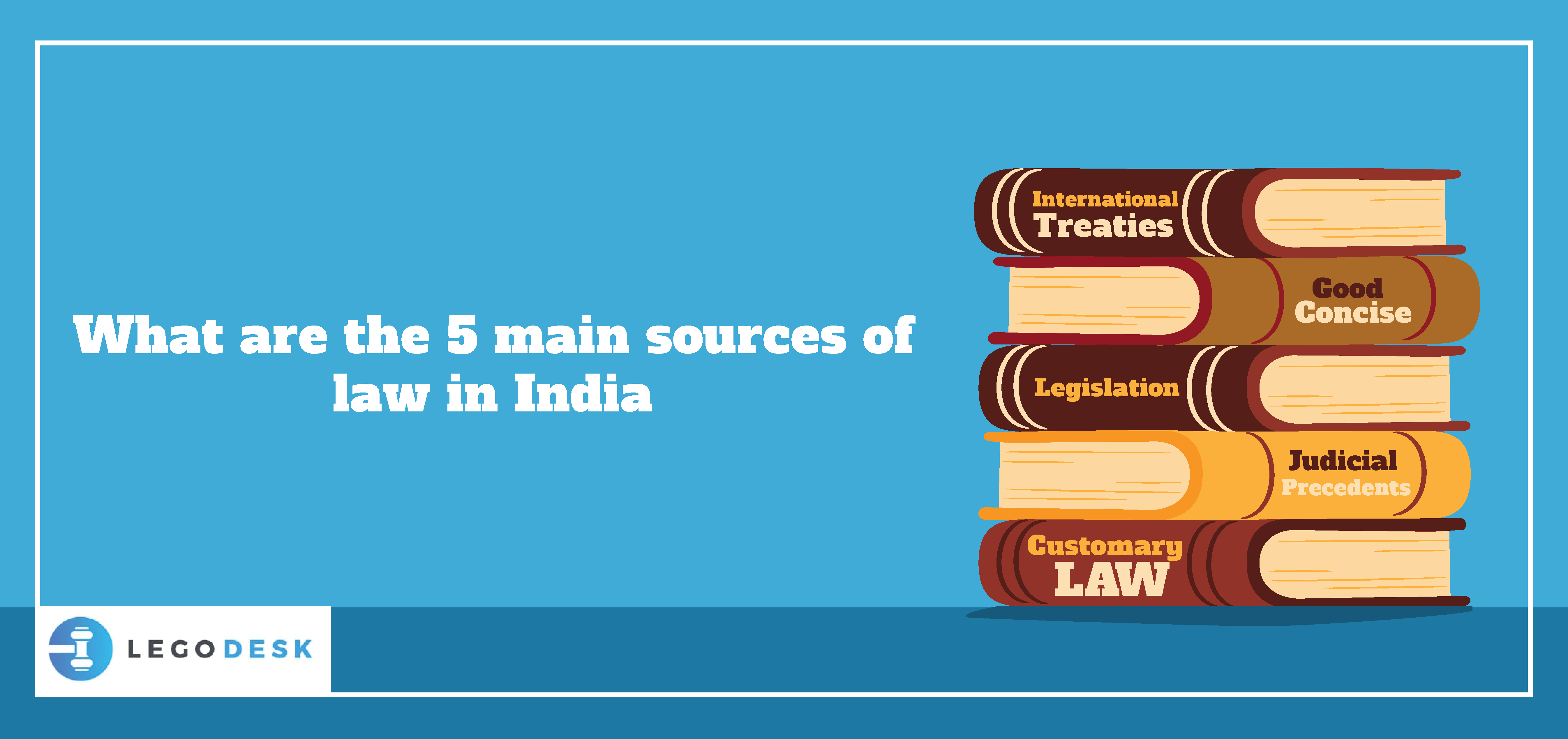
The word ‘law’ is of great parlance in today’s world. It is very essential to know the law of land to survive in society and escape from its unethical behavior. To determine the law, it is important to know its sources and from where it is derived. Law in India has been derived from multiple sources ranging from customs, religion, scientific commentaries, justice, equity, and good concise to International treaties and agreements.
Let’s know the five main sources of law in India-
Customs or Customary Law
Customs is the oldest law and one of the main sources of law in India. When a particular practice is followed from a long time by people habitually or regularly, then that practice is followed as a custom for the future purpose. According to Salmond, ‘custom is the embodiment of those concepts which have counseled themselves to the countrywide judgment of right and wrong as the ideas of justice and public utility.’
Roscoe Pound determined the ingredients that form customary laws. According to Pound customs comprises of laws formed through judicial choice, through customs of famous motion, and with the aid of doctrinal writings and clinical discussions.
Ingredients of Customs-
- Antiquity
- Continuous
- Peaceful Enjoyment
- Obligatory in nature
- Certainty
- Consistency
- Reasonability
Judicial Precedents
Judicial Precedents rests on the doctrine of ‘stare decisis.’ The doctrine implies adhering and relying on earlier decisions made by the courts. The doctrine of stare decisis rests on public policy. This brings confidence in the public eye, and the administration of justice becomes crystal clear.
The decisions of the lower bench can always be overruled by the higher bench by giving due reasonings. The Supreme Court in Golaknath v. State by 6- judge bench gave a decision that Fundamental Rights are not amendable. Later in Keshvanand Bharti v. the State of Kerala by 13-judge bench overruled the Golaknath case.
Usually, there are two principles that need to be followed-
- In practice, the rule implies that lower courts are bound to apply the legal principles set down by higher courts in earlier cases. This provides consistency and predictability in the law. For example- the decision of SC’s higher bench is bound by its lower bench.
- Secondly, the higher court is bound by its own decision in general in the same matters related to precedence.
” It is true that in the system of justice which is being administered by the courts, one of the basic principles which have to be kept in view is that courts of coordinate jurisdiction, should have consistent opinions in respect of an identical set of facts or on a question of law. If courts express different opinions on the identical sets of facts or question of law while exercising the same jurisdiction, then instead of achieving harmony in the judicial system, it will lead to judicial anarchy.”[1]
Legislation
According to Salmond, “legislation is that source of law which is composed within the declaration of prison regulations by using an able authority.”
The legislation is one of the primary sources of law in India. Legislation has a very wide ambit and is used to regulate, authorize, to enable, to provide funds, to prescribe, to sanction, grant, declare, or to restrict. The legislation is framed by parliamentary actions in the form of Acts, new laws and amendment and repeals of the old law. The procedure by which the parliament frames legislation is prescribed in the Constitution of India.
There are usually two types of Legislation-
- Supreme Legislation: The law that originates from the sovereign strength of the nation. It is the parent or the ultimate law which cannot be annulled, repealed, or managed by other legislative authority.
- Sub-ordinate Legislation: This sub-ordinate legislations are dependent on supreme legislation when it comes to their validity or existence.
Justice, Equity and
It means according to the justness, fairness, or good concise. This principle is applied in such scenarios where the law is either inadequate or becomes obsolete or unjust. The judges apply their common sense and act in accordance with justice, equity, and good concise and deal with the cases. The law should impart justice, equity, and good concise.
International Treaties/ Agreements
The term ‘globalization of law’ means that the whole world is bound by a single set of law. Such rules are harmonized by the United Nations, which stands at the forefront. Members of the United Nations accept the norms or rules that are laid down by the organization. India is one of the members of the United Nation has to abide by its statutes and rules and consequently frame the laws in conformity with such rules.
Therefore, International treaties and conventions play a very significant role in framing new laws and acts as one of the sources of law.
Conclusion
The source of law always gives us an understanding of the reason or the purpose for which the law is framed. This makes it very important for us to know the sources of law. The source of law carries its authenticity and therefore, should be determined carefully. The source of law also becomes important in the application of the law in different areas. There are many other sources of law, like religion, caste, regional practices, etc. The Parliament considers various aspects while framing new laws.
[1]Hari Singh Vs. State of Haryana, (1993) 3 SCC 114.

